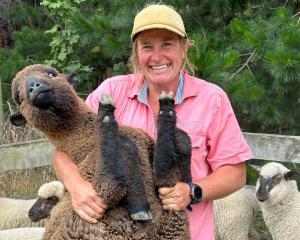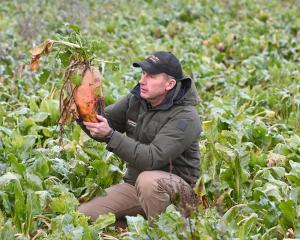
It was standard practice to ask four main questions; whether he was off a farm, what his parents did, what sport he played and at what level, and where he wanted to work in New Zealand.
It took about 10 minutes and no CV was required. Soon after, he was off to Invercargill which was to prove a good training ground with great people and understanding farmers.
Previously, he attended Lincoln where he graduated with a commerce degree in agriculture.
His father was an accountant in Gore and he spent a lot of time on a friend’s farm at Charlton growing up, whetting his interest in the sector.
Blair worked as a relationship manager specialising in agri for 43 years, most recently with ANZ, before retiring in July.
His nomination said he had learned his craft by time and experience, building strong relationships while still being a challenger and trusted adviser at the same time. Respected by his clients and professionals alike, he had great industry knowledge.
His career could have been curtailed in his younger years when he went on an overseas adventure for a year, on leave without pay.
He was in North India and the year was nearly up, so he wrote to his manager asking for another 12-month extension. If denied, then the letter was to be treated as a resignation.
He then phoned his father to check if anything had arrived in the mail from the bank and, extension confirmed, he continued his travels.
Three days before the next year was up, he arrived in Auckland and hitch-hiked through the North Island before phoning his manager, arriving in a grubby old T-shirt and pink trousers. He was to start as soon as he could.
During the time the Rural Bank was getting prepared for sale, there were stressful discussions. He recalled the discount meetings when the bank was writing off debt with creditors sitting around the table.
A husband and wife were sitting at the table, along with about 10 creditors, when the husband looked up, passed out and fell off his chair, crashing on to the ground.
In a daze, his wife looked down at her husband on the floor, looked up at the creditors and shrugged her shoulders.
"We were acting more like the emergency services do in major traumatic events . . . it’s really after the fact it really hit home how traumatic it was."
From Canterbury, Mr Fieldes moved to various positions in Southland, including as a branch manager in Tuatapere, a place which was "lots and lots of fun".
That was where he learned a very valuable banking lesson, of being about to divide yourself between being good friends with somebody and then the next day having a client-banker relationship.
In latter years, Mr Fieldes has been based in Central Otago, living on a property steeped in history at Bannockburn. While they build a new house on the site, the more than century-old sod cottage his great-grandfather lived in when he first came to gold mine in New Zealand from the Shetland Isles will remain.
What he particularly enjoyed about his career was the people; being part of a farming business and seeing succession discussed and the successful movement of an asset from one generation to another, and also being part of growth within a generation.
The area had a variety of different farming and horticulture types, from intensive irrigated properties to extensive operations, and knowledge and skills were required to converse with clients.
Mr Fieldes has done a lot of tramping, climbing and mountaineering and used to be in Alpine Cliff Rescue and Search and Rescue. He also used to be a scuba diving instructor.
Since moving to Central Otago and being further from the water, he had taken up hunting. In his retirement, he had a "wet weather job" — a big shed and a Series II Land Rover to get back on the road.
He was looking forward to more hunting — "filling the freezer and other people’s freezers" — learning to fly fish, and also kicking back and relaxing in an area he described as the couple’s "happy place".















